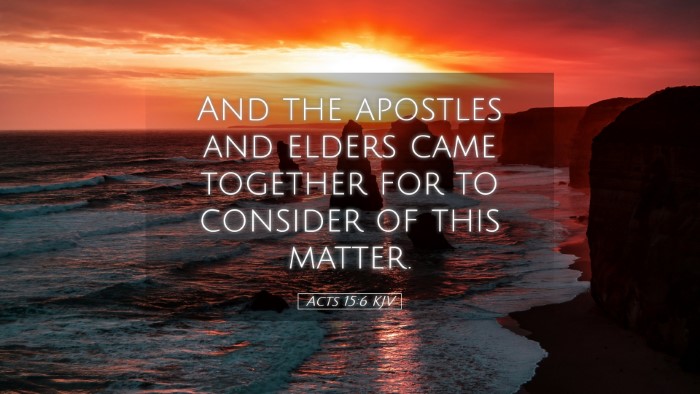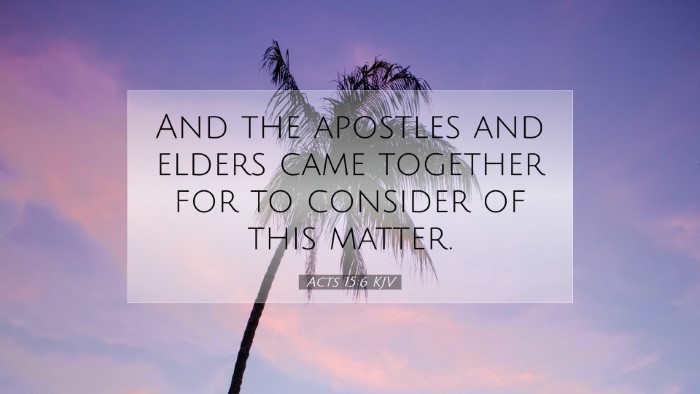Acts 15:6 - Commentary Overview
The verse Acts 15:6 states: "And the apostles and elders came together for to consider of this matter." This passage is a critical moment in the early Church, reflecting the burgeoning challenges of the Gospel's expansion into Gentile territories and the associated theological questions.
Context and Significance
Acts 15 narrates the significant event known as the Jerusalem Council, where pivotal decisions were made regarding the inclusion of Gentiles in the Christian faith. This gathering was essential for addressing the tension between Jewish and Gentile believers concerning the necessity of adhering to the Mosaic Law.
Purpose of the Gathering
The apostles and elders convened to deliberate on whether converts from pagan backgrounds should be compelled to follow Jewish customs and laws, particularly circumcision. This discussion echoes throughout the New Testament, highlighting the Church's struggle with identity and grace.
Insights from Public Domain Commentaries
Matthew Henry's Commentary
Matthew Henry emphasizes the gravity of the apostles' meeting, noting that the gathering signifies unity and diligence in theological matters. He asserts that the apostles and elders exhibited a commitment to truth and the Gospel, prioritizing a collective approach in resolving doctrinal debates. Henry underscores the importance of gathering for spiritual matters, reminding readers of the value placed on communal discernment.
Albert Barnes' Notes
Albert Barnes provides insights into the procedural aspects of the council. He notes that it was characterized by a spirit of inquiry and deliberation. Barnes points out that the use of "apostles and elders" designates a collaborative leadership structure within the early Church. He explains that this gathering was essential for establishing clarity in the early Christian community and highlights the significance of such councils in maintaining doctrinal integrity.
Adam Clarke's Commentary
Adam Clarke brings attention to the cultural and religious implications of the discussion at hand. He comments on the diverse backgrounds of the participants, which influenced the discourse. Clarke's insights reflect on the broader implications of accepting Gentiles without the burden of the Law and suggest that the outcomes of the council fostered a more inclusive Church. This inclusion was essential for the growth of Christianity as a global faith.
Theological Reflections
The council's decision-making process as illustrated in Acts 15:6 provides contemporary church leaders with vital lessons in leadership, community, and inclusivity. The unity in diversity shines through in the early Church's approach; they were willing to listen, debate, and ultimately seek God's guidance in difficult matters. These qualities are especially pertinent for today's pastors, students, and scholars who navigate the complexities of modern faith communities.
Unity in Disagreement
One of the key takeaways from this verse and its context is the significance of unity among believers, even when disagreements arise regarding theological issues. The assembly of the apostles and elders serves as a model for contemporary church governance and conflict resolution. Their collective decision reflects a commitment not just to the individuals involved but to the integrity of the Christian community at large.
Criteria for Decision Making
The apostles and elders did not meet in isolation but rather in a community setting where diverse voices could be heard. This openness to dialogue is crucial for any church today. As noted by Henry, Barnes, and Clarke, the heart of such gatherings must be grounded in prayerful consideration and scriptural fidelity. Seeking wisdom through collaboration is essential for effective church leadership.
Practical Application
For pastors, the implications are clear: the pursuit of unity in Christ should always take precedence over cultural or personal preferences. The challenges addressed in Acts 15 resonate with modern issues of inclusivity and doctrine within church circles. Understanding the early Church's approach can guide leaders in navigating contemporary tensions while remaining faithful to the Gospel core.
Fostering a Culture of Dialogue
Church communities are encouraged to create spaces where theological discussions can be held in love and respect, mirroring the environment of the Jerusalem Council. By maintaining a council-like approach, whether through formal church meetings or informal gatherings, congregations can embrace the rich tapestry of perspectives within their midst.
Conclusion
Acts 15:6 stands as a powerful testament to the early Church's commitment to engage with difficult issues through prayer, dialogue, and community decision-making. The reflections drawn from public domain commentaries by Matthew Henry, Albert Barnes, and Adam Clarke highlight the timeless attributes of unity, grace, and inclusivity that should inspire today’s pastors, students, and theologians.


